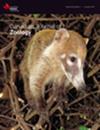连夜奔跑,奋力寻找海冰:来自俄罗斯的北极狐(Vulpes lagopus)的长途迁徙
IF 1.1
4区 生物学
Q3 ZOOLOGY
引用次数: 0
摘要
鉴于北极最近变化的规模、速度和复杂性,我们对其对北极生物群的多重影响的理解仍然有限。我们首次详细介绍了一只北极狐(Vulpes lagopus Linnaeus,1758)在广阔的俄罗斯北极地区的长距离移动,它使用GPS/铱项圈进行追踪,提供了相当高的精度(几米)和定位频率(每4小时一次)。揭示的北极狐的昼夜活动模式表明,在最激烈的运动时期,它在夜间跑得更远,在白天跑得最短。移动记录显示,有几次试图离开这片土地,因为它似乎在亚马尔半岛的不同地区四次遇到开阔水域。这只北极狐穿过鄂毕河湾前往吉丹半岛,穿越过程中不连续冰的卫星图像表明,它可能停留在浮冰上。我们的观察结果可能支持这样的证据,即海冰持续时间和范围的减少可能会影响北极狐的长距离覆盖能力,从而从长远来看,影响种群之间的连通性。需要进行类似的研究,以了解北极狐在不断变化的北极的运动生态学。本文章由计算机程序翻译,如有差异,请以英文原文为准。
Running overnight and struggling to find sea ice: long-distance movement by an arctic fox (Vulpes lagopus) from Russia
Given the scale, speed and complexity of recent changes in the Arctic, our understanding of their multiple implications for Arctic biota is still limited. We detail for the first time in the vast Russian Arctic the long-distance movement of an arctic fox (Vulpes lagopus Linnaeus, 1758) tracked with a GPS/Iridium collar providing considerably high precision (several meters) and frequency of locations (every 4 hours). Revealed diurnal activity patterns of the arctic fox indicate that it ran greater distances in night hours and shortest in day hours during the most intense movement period. The movement records suggested several attempts to leave the land, as it seemed to encounter open water four times on different parts of Yamal peninsula. The arctic fox crossed the Ob Bay towards the Gydan peninsula and satellite imagery of discontinuous ice during crossing suggested that it might have stayed on pieces of floating ice. Our observation may support evidence that a reduction in the duration and extent of sea ice could affect the ability of arctic foxes to cover long distances and thus, in the long-term, the connectivity between populations. Similar studies are needed aiming to understand movement ecology of the arctic foxes in the changing Arctic.
求助全文
通过发布文献求助,成功后即可免费获取论文全文。
去求助
来源期刊

Canadian Journal of Zoology
生物-动物学
CiteScore
2.40
自引率
0.00%
发文量
82
审稿时长
3 months
期刊介绍:
Published since 1929, the Canadian Journal of Zoology is a monthly journal that reports on primary research contributed by respected international scientists in the broad field of zoology, including behaviour, biochemistry and physiology, developmental biology, ecology, genetics, morphology and ultrastructure, parasitology and pathology, and systematics and evolution. It also invites experts to submit review articles on topics of current interest.
 求助内容:
求助内容: 应助结果提醒方式:
应助结果提醒方式:


